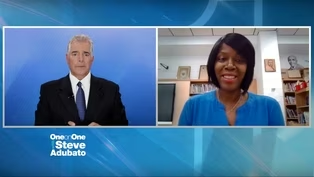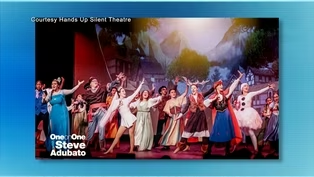One-on-One
Creating mentorship opportunities for young men in Newark
Clip: Season 2025 Episode 2828 | 9m 6sVideo has Closed Captions
Creating mentorship opportunities for young men in Newark
Steve Adubato speaks with Quadeer Porter, Founder and Executive Director of Brothers Building A Better Nation and 2022 Russ Berrie Making A Difference Award Honoree, to discuss the importance of providing young men in Newark a safe space for mental health support, tutoring, and mentorship.
Problems playing video? | Closed Captioning Feedback
Problems playing video? | Closed Captioning Feedback
One-on-One is a local public television program presented by NJ PBS
One-on-One
Creating mentorship opportunities for young men in Newark
Clip: Season 2025 Episode 2828 | 9m 6sVideo has Closed Captions
Steve Adubato speaks with Quadeer Porter, Founder and Executive Director of Brothers Building A Better Nation and 2022 Russ Berrie Making A Difference Award Honoree, to discuss the importance of providing young men in Newark a safe space for mental health support, tutoring, and mentorship.
Problems playing video? | Closed Captioning Feedback
How to Watch One-on-One
One-on-One is available to stream on pbs.org and the free PBS App, available on iPhone, Apple TV, Android TV, Android smartphones, Amazon Fire TV, Amazon Fire Tablet, Roku, Samsung Smart TV, and Vizio.
Providing Support for PBS.org
Learn Moreabout PBS online sponsorship(upbeat music) - Hi, everyone, Steve Adubato, we kick off the program welcoming back once again, Quadeer Porter, who's founder and executive director of a terrific organization called Brothers Building a Better Nation, a 2022 Russ Berrie Awardee for Making a Difference.
Quadeer, good to have you back.
- Thank you so much to having me back.
I'm so excited to be here.
- You got it.
By the way, go on our website.
It's up there right now to check out the previous interview with Quadeer.
Tell us exactly again what the organization is and the most pressing needs of the folks you serve in 2025.
- Absolutely, Brothers Building a Better Nation is a nonprofit organization based in Newark, New Jersey.
And our main purpose is to dismantle systemic barriers that are causing brothers in our community either self harm or put 'em at risk of self harm.
And so one of the most pressing issues we're currently seeing right now is that a lot of brothers need mental healthcare and somebody to talk to.
And so we actually expanded our services to meet that.
We actually got contracted with Medicaid, and now we're able to do intensive in-community services, which means therapy right in the home for these young men and also mentorship services and tutoring services for brothers as well, between the age of 4 and 21.
So, we've made some progress since the last time you met us.
- So, let me ask you this.
In 2025, with the world around us changing quickly, lots of uncertainty and challenges, to what degree do you believe black men, younger black men, in particular, are more at risk and challenged than ever before?
- Right now, they are going through, especially when you look at the statistics, suicide and self-harm is ranked the third most route for avoidable deaths for this population, for us brothers of color, and a lot of times, because we hold everything inside, and especially now in today's conditions, a lot of us are, especially, we're seeing them as after COVID, the COVID pandemic.
A lot of youth was not actively in school.
And so a lot of the youth that went back to school had some challenges in school, led to frustrations.
So a lot of these after effects led to different mental health behavioral health effects, especially at this age range between 14 and 21.
And that's what we're really trying to address right now, is that it was not only that feeling of that, there being other not seen, it's now this feeling of them being left behind and not being heard.
And so those are the things that we're seeing on the ground level right now is really showing brothers that you are seen, you are heard, and just trying to find a safe space for them, which is hard for them to find.
- I don't know if statistics bear this out, but there are folks who believe that in the African American community to have therapy, that getting help for mental health challenges is more challenging because there's some degree of resistance, skepticism.
Do you buy that?
- Yes, I mean, historically, we've seen it.
Mental health and behavioral health was actually used as a tool to incarcerate people of color from the Jim Crow era to all the way up to the '90s.
Misdiagnosis of people of color is is high.
For example, schizophrenia, there was a big study that was done from, I think it was the University of Chicago, that dealt with that, so it's a big fear when it comes to hear mental health.
But the biggest thing that we argue is that this is why it's important to have culturally competent care.
Right now, there's not a lot of brothers in the mental- - Explain that, Quadeer, culturally competent care, please.
- Yes, culturally competent care is we are getting care with somebody that you can recognize, somebody you can empathize with, somebody that looks like you, and somebody that you can feel has walked through your shoes a little bit.
And that's what we're able to deliver.
- You know what's so interesting about that?
You talk about the need for culturally competent care, people who look like you, people who have some experiences like you.
I'm not gonna get into a whole discussion about diversity, equity, inclusion, which, listen, that's a different, it's in some ways, it's a different discussion.
But the reality is having people who understand your experience requires a degree of diversity in the healthcare community, including mental health therapists.
Please, Quadeer, talk about that.
- I absolutely do agree.
You automatically see when the young men see somebody that looks like them, they connect to the guy, especially during puberty, right?
When you're going through puberty and a lotta times these young men are either angry or they're exhibiting what looks like anger, but it's not really anger.
They're just, like I said, just normal things that young men go through, but on the outside, it looks like they're something that is a threat.
And so by meeting somebody that says, like, "Hey, listen brother, understand what you're going through, and this is how either you exercise or you do these common things to help you calm down, this is what it looks like," and it's not a person that's timid and fearful of them and automatically wants to call 911 to bring them away, if somebody's able to deescalate them because they understand some of the social pressures they went through.
- You know what's interesting, right now, you're pursuing your master's in social work.
- Yes.
- Because?
- Because there needs to be more brothers in this field.
When I was first trying to get into this field and find my young men therapists, there was hardly anybody that looked like them.
And the brothers that were looking like them, they were overbooked for months ahead of events.
So I said, the least I can do is try to, if I'm gonna be serious about what I am doing, that I have to join the battle against, you know, against my mental health disparities going on in my community and go back to school and learn the right way to do it.
So that's why I signed up for a Rutgers School of Social Work, and it's been a blessing in my life.
- Last question, why are you so passionate about this cause?
- It's because I feel like I've found my life purpose, and it's hard to really put into words, but it's a feeling.
It's similar to how you, Mr. Adubato, when a camera turns on.
It's natural.
It's something that you can't really put into words.
It's just something that, when it happens, you feel is right, and that's what I feel like my work.
I've lived 34 going on 35 years on this earth right now.
And these last five years, I finally found, like, it was something that when I wake up, I'm naturally doing, and I'm always done.
I just never knew what it was.
And it turned out to be just this organization, Brothers Building a Better Nation because I was just tired of people seeing us as threats and people that was looking to tear up the community.
I wanna show that we're loving, compassionate, and we're empathetic individuals that just needs care like anybody else.
And that's what resonated with me, what continues to fuel me.
- You know, Quadeer, I'm a student of leaders, leadership, what causes people to be great leaders.
And sometimes it's hard to describe in words, but you know it when you see it, and you know it when you see one, a leader, and there's no substitute for the degree of passion you have, but I'll say this.
You found your calling, and others are benefiting because of that, and all of us in the public television community wish you and your colleagues at Brothers Building a Better Nation all the best.
Keep doing what you're doing and keep coming back and giving us an update.
Congratulations and more work to be done.
Well done, Quadeer.
- Thank you so much.
- You got it.
I'm Steve Adubato.
That's a leader, Quadeer Porter.
Stay with us.
We'll be right back.
- [Narrator] One-On-One with Steve Adubato is a production of the Caucus Educational Corporation.
Funding has been provided by The Russell Berrie Foundation.
RWJBarnabas Health.
Let’s be healthy together.
The North Ward Center.
The Fidelco Group.
Robert Wood Johnson Foundation.
New Jersey Sharing Network.
PSEG Foundation.
Johnson & Johnson.
And by The New Jersey Education Association.
Promotional support provided by NJ.Com.
And by NJBIZ.
- How long you been waiting?
- About a half hour.
- Brutal.
This keeps up, I'm gonna miss my pickleball game.
- I've been waiting eight years for a kidney.
What can you do?
(gentle music) - [Narrator] Over 100,000 people in the US are waiting for a life-saving transplant.
But you can do your part in an instant.
Register as an organ donor today at NJSN.org.
Examining the needs of children and families with autism
Video has Closed Captions
Clip: S2025 Ep2828 | 9m 9s | Examining the needs of children and families with autism (9m 9s)
Inclusive alternatives to theater for the Deaf community
Video has Closed Captions
Clip: S2025 Ep2828 | 10m 13s | Inclusive alternatives to theater for the Deaf community (10m 13s)
Providing Support for PBS.org
Learn Moreabout PBS online sponsorship
- News and Public Affairs

Top journalists deliver compelling original analysis of the hour's headlines.

- News and Public Affairs

FRONTLINE is investigative journalism that questions, explains and changes our world.












Support for PBS provided by:
One-on-One is a local public television program presented by NJ PBS

